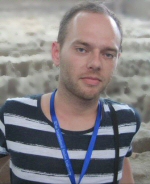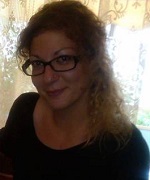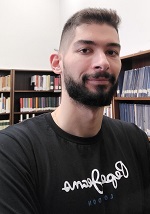Group Members
Academics
 |
Angeliki Athanasiadou - Coordinator Angeliki Athanasiadou is Professor at the Department of Theoretical and Applied Linguistics of the School of English at Aristotle University of Thessaloniki in Greece. She holds an M.A. in Theoretical Linguistics and a Ph.D. in General Linguistics. Her teaching and research interests are in the framework of Cognitive Linguistics and, in particular, in the relation of areas of grammar with cognition, the study of Metaphor Metonymy, the language of Emotions. Her publications include books (On Conditionals Again, A. Athanasiadou, R. Dirven (eds.), CILT series 143, J. Benjamins/Amsterdam, 1996, pp. 414; Speaking of Emotions: Conceptualization and Expression, A. Athanasiadou, E. Tabakowska (eds.), CLR series 10, Mouton de Gruyter, 1998, pp. xxii, 444; Γνωστικές Ανιχνεύσεις στη Γλώσσα και στη Γλωσσολογία (Cognitive Exploration of Language and Linguistics), A. Athanasiadou and M. Milapides, University Studio Press, Thessaloniki, 2004, pp. 348; Subjectification: Various Paths to Subjectivity. A. Athanasiadou, C. Canakis, B. Cornillie (eds.). Mouton de Gruyter, CLR series 2006); Studies in Figurative Thought and Language, 2017, HCP 56, Benjamins, Amsterdam; Irony in Language Use and Communication, A. Athanasiadou & H. L. Colston (Eds.) 2017, FTL 1; The Diversity of Irony, A. Athanasiadou and H. L. Colston (Eds.). (2020). Mouton de Gruyter) as well as articles in books and international journals. more ... |
 |
Eleni Butulussi Eleni Butulussi is Prof. Emerita of Applied Linguistics, School of German Language and Philology at Aristotle University of Thessaloniki. She has served as Chair (2009-2013) at the School of German Language and Philology and has recently retired (2021) after having worked there for 35 years. She holds an M.A. (University of Cologne) and a Ph.D. (University of Tübingen) in Applied Linguistics. Her teaching and research interests are in the framework of (Critical) Discourse Analysis, Contrastive German-Greek Cultural Studies and Educational Linguistics, in particular, in the study of migration, financial crisis, and education discourse. She has published several articles on these subjects in academic journals, edited collections and conference proceedings as well as books (e.g. Bickes, H. & Butulussi, E. u.a. 2012. Die Dynamik der Konstruktion von Differenz und Feindseligkeit am Beispiel Griechenland: Hört beim Geld die Freundschaft auf? Kritisch-diskursanalytische Untersuchungen der Berichterstattung ausgewählter deutscher und griechischer Medien (Constructing difference and animosity - The case of Greece: Does friendship stop when money issues start? Critical discourse analysis studies in selected articles from the German and Greek press). München: Iudicium. / Κωτσάκης, Δ. & Μουρελή, Ε. & Μπίμπου, Α. & Μπουτουλούση, Ε. κ.ά. 2010. Αναστοχαστική Πράξη. Ο αποκλεισμός στο σχολείο. Αθήνα: Νήσος. / Butulussi, E. 1991. Studien zur Valenz kognitiver Verben im Deutschen und Neugriechischen (Studies in the Valence of Cognitive Verbs in German and Greek). Linguistische Arbeiten 67. Tübingen: Niemeyer). more ... |
 |
Parthena Charalampidou Parthena Charalampidou holds a PhD in Website Localisation and Translation with a focus on the localisation of multimodal metaphors in persuasive discourse. She is a Tenured Teaching and Research Fellow in the Department of Translation Studies at the School of French, Aristotle University of Thessaloniki. She also teaches at the European Master’s in Translation (EMT) Programme “Interpreting and Translation” and she is a Research Associate at the Laboratory of Translation and Natural Language Processing, Aristotle University of Thessaloniki. Her research interests include semiotic, rhetorical and cultural approaches to translation, as well as localisation of promotional digital genres and application of technology and corpora to multimodal translation. She has published several articles on these subjects in specialised journals such as The Journal of Internationalisation and Localisation, Benjamins and the Journal of Specialised Translation and she is co-editor of “New Perspectives in Media Translation: Transcreation in the Digital Age by Palgrave Macmillan. She is also Treasurer of the Greek Society for Translation Studies and member of the European Society for Translation Studies. |
 |
Thanasis Georgakopoulos Thanasis Georgakopoulos is Assistant Professor at the Department of Theoretical and Applied Linguistics of the School of English at Aristotle University of Thessaloniki in Greece. He holds an M.A. in Theoretical Linguistics and a Ph.D. in General Linguistics. In the past, he held various academic positions at the Aristotle University of Thessaloniki, the Free University of Berlin, the Humboldt University of Berlin, the University of Münster, the University of Kassel, the University of Liège (Marie Curie BeIPD Cofund Postdoctoral Fellowship), and the National Research University (Higher School of Economics) in Moscow. His research focuses on language change and typology, with semantics being the main connecting thread. His publications include articles in books and international journals (e.g., Constructions and Frames, Journal of Historical Linguistics, Languages in Contrast, Linguistic Typology, Studies in Language). Since 2019 he is the Review Editor of the Journal of Historical Linguistics. more ... |
 |
Vassiliki (Bessy) Geka Vassiliki (Bessy) Geka holds an M.A. (summa cum laude) in Applied Linguistics and a PhD (Hons) from the National and Kapodistrian University of Athens (NKUA). During her studies, Bessy received scholarships and prizes by the State Foundation of Scholarships (ΙΚΥ) and the Department of Bequests of NKUA. She was also awarded the Ryoichi Sasakawa Young Leader Scholarship by Tokyo Sylff Foundation for her doctoral research which focused on investigating dialogic perspectivisation as indexed by discourse-level constructions. Bessy has served as a Research Associate of the Research Centre for Language, Teaching, Testing and Assessment (NKUA) while she has also been involved in a number of research projects during her doctoral studies. She is currently an Adjunct Professor of the Hellenic Police Academy (2015-present), the Hellenic Air Force NCO Academy (2021 – present) and the Hellenic American University (2021-present). Further to these, she also holds the position of the Deputy Director of the Centre for Applied Linguistics and Language Studies of the Hellenic American Union. Her research endeavours relate primarily to Construction Grammar (CxG) and Cognitive Linguistics, while also extending or opening up to insights from Applied Construction Grammar and Applied Linguistics. more ... |
 |
Thomi Dalpanagioti Dr Thomi Dalpanagioti is a member of the Laboratory Teaching Staff at the Department of Theoretical and Applied Linguistics, School of English, Aristotle University of Thessaloniki. She holds an MA in Lexicography (Theory and Practice) and a PhD in Linguistics-Lexicography from the National and Kapodistrian University of Athens. She has taught English as a Foreign Language at all levels of education and worked as an adjunct researcher at the Centre for the Greek Language and as an adjunct lecturer at the Hellenic Open University, Greece, and the University of Nicosia, Cyprus. Her research interests are in the areas of lexicology, (monolingual/ bilingual) lexicography and vocabulary acquisition. In particular, her research focuses on the application of Cognitive Linguistics (CMT, Frame Semantics) and Corpus Linguistics in the study of polysemy and phraseology. Her work has been presented in international conferences and published in conference proceedings and peer-reviewed journals. Her current research with the title “Integrating frame semantic resources into EFL instruction: Developing and piloting materials for enhancing learners' metaphoric competence in EFL” is conducted with the support of A.S. Hornby Educational Trust (A.S. Hornby Dictionary Research Awards 2022). more ... |
 |
Karali Maria more ... |
 |
Linda Manney My research interests include all areas of Cognitive Linguistics, with a special interest in conceptual blending and the discourse function of metaphor, metonymy and irony, cognitive poetics, and the study of autobiography as a blended genre. I am also interested in multimodal metaphor and its function in a range of media texts. more ... |
 |
Anna Piata Anna Piata is Assistant Professor in Semantics & Pragmatics at the Faculty of English Language and Literature (Department of Language and Linguistics) of the National and Kapodistrian University of Athens. Anna’s research is informed by a cognitively oriented approach to linguistic meaning. Her interests include metaphor theory, the representation of time in language, the linguistic study of humor, and the application of linguistic theories to literary analysis. Anna holds a BA in Philology (National and Kapodistrian University of Athens) and an MPhil in Linguistics (University of Cambridge). She received her PhD from the Faculty of English Language and Literature of the National and Kapodistrian University of Athens (with a scholarship from the Greek State Scholarship Foundation). Prior to her employment at the National and Kapodistrian University of Athens, Anna was a postdoctoral researcher and a teaching fellow at the Center for Cognitive Science of the University of Neuchâtel. For her postdoctoral project at the Swiss Center for Affective Sciences of the University of Geneva she was granted a Swiss Government Excellence Scholarship for Foreign Scholars. Her publications include the monograph “The poetics of time: Metaphors and blends in language and literature” (John Benjamins, 2018) and numerous articles in international journals (Journal of Pragmatics, Metaphor & Symbol, Pragmatics & Cognition, Metaphor & the Social World, etc.) and edited volumes (published with John Benjamins, Oxford University Press, Mouton de Gruyter, etc.). Anna has also co-edited the collective volume “Time representations in the perspective of human creativity” (with Daniel Alcaraz and Adriana Gordejuela; John Benjamins, 2022). Since 2020 she serves as the Managing editor of the journal Pragmatics & Cognition. more ... |
 |
Giota Syrpa My research focuses on the motivation of grammatical structure by figurative thought, especially on the role of metaphor and/or metonymy as the two basic explanatory principles for semantic extension. I am also interested in the way metaphor and figurative language in general is used in teaching English for Specific Purposes. more ... |
 |
Anastasios Vogiatzis My research focuses on Cognitive linguistics, and in particular on processes such as metaphor and metonymy. The core of my interests is located in language, politics, and the media. Of particular interest to me are the ways these three converge in order to manufacture consent, or even to enforce it. Apart from this, idiomatic expressions draw my attention, with the motivating forces that give rise to them being under my Cognitive linguistic microscope. Additional areas of interest are Cognitive applied linguistics, gesture and sign research, and corpus management. more ... |
 |
Despoina Felekidou Despoina Felekidou is currently working as an English Teacher at the Experimental Primary School for students with disabilities and special educational needs in Rhodes, Greece. Her research interests lie in the fields of Cognitive Linguistics, Critical Discourse Analysis and Corpus Linguistics. More specifically, the use of figurative language in political as well as classroom discourse draws her attention. She has recently started exploring the language that former addicts use to communicate their experience, too. more ... |
PhD candidates
 |
Efthimia Apokatanidis My main research focuses on the relationship between language, emotion, and mental illness. I follow an interdisciplinary approach, which combines insights and methods from the fields of Cognitive Linguistics, Discourse Analysis, and Social Semiotics. My thesis explores the role of figurative language –mainly metaphor and metonymy– in the expression of an intense and traumatic experience like depression. I investigate the interplay of metaphor and metonymy both linguistically, through written accounts, and multimodally, through visual representations in artworks, from people who have experienced the disorder. Additionally, I’m also interested in what role sadness –and its own role in social connection– plays in language use and comprehension. more ... |
 |
Dimitra Chatzikyrkou My research interests include the use of figurative language in areas of science. In particular, I am interested in the role of metaphor, metonymy, irony as well as any combinations between them in the conceptualisation and expression of domains related to the medical field. more ... |
 |
Anastasia Naka My research interests lie in the areas of cognitive linguistics, historical linguistics and sociolinguistics. My thesis applies a sociocognitive approach to the economic and theological lexical fields of Modern Greek. In particular, I examine the creation of economic vocabulary and investigate its semantic utilization within theological discourse. The ultimate objective is to highlight the nature and function of the cognitive mechanisms involved in the creation of technical terms in specialised lexical fields and their reuse in other fields. more ... |
 |
Paraskevi Pavlopoulou Cognitive Linguistics has been a domain that I knew nothing about but came to find out more about it through courses on Metaphors in the Department of English, AUTh and ever since, I have changed my point of view on different aspects of everyday life such as the expression of feelings and how language can be perhaps the most powerful of tools. However, while this comes on a theoretical basis, it could also shift the way education works and how languages are taught. Perhaps a more cognitive approach to language would be much more efficient in language learning than it is now. Therefore, I have been working on incorporating a cognitive view into the current EFL educational system hoping that this will be followed by others and eventually become the norm. I have focused my interest on the language of emotions and will try to pass this focus on to as many students as I can. more ... |
 |
Evangelos G. Tsigaridas My research focuses on the construction and presentation of characters in literary texts. Specifically, I am interested in the interactions between characters in Ovid’s Metamorphoses and the nexus created among them by multiple narrative levels. Central to this work is also the question of how the reader engages with the characters and understands their thoughts, emotions, and intentions, attributing to them specific mental states. Given the exceptional epic character of the Metamorphoses, my investigation prioritizes the stylistic devices that reveal how the poet/narrator actively constructs and manipulates the reader’s embodied experience of the narrative. I address these by applying an interdisciplinary approach drawing on Cognitive Narratology, Cognitive Linguistics, and the Philosophy of Mind. more ... |
 |
Theodoros A. Xioufis
My interests include cognitive semantics and psycholinguistics. My main research deals with the relationship between language and emotion through an interdisciplinary perspective, which includes mainly cognitive linguistics and neurosciences. I focus on the figurative language of romantic love in Modern Greek and I examine, using different methodological tools (such as corpora and questionnaires), the relationship between figurative and non-figurative language, the interaction between figures (metaphor and metonymy) and the functionality of figurative language across different genres. I am also interested in grammar within the cognitive paradigm. more ... |
MA holders
 |
Pantazis Stougianas more ... |
 |
Maria Tsitoura My main academic interests lie in the field of Cognitive Linguistics, and in particular, in the cognitive principles underlying the various grammatical constructions, as well as in the role that the figurative processes of metaphor and metonymy play in the motivation and meaning elaboration of grammatical constructions. As an English language teacher, I am interested in probing into the ways cognitive linguistic insights promote and facilitate the learning and acquisition of grammatical constructions. My research interests also concern Second Language Acquisition, foreign language learning and Neurolinguistics. more ... |
MA candidates
 |
Kyriaki Kallianou Kyriaki Kallianou holds a B.A. (“Excellent”) in German Language and Literature and continues her studies in the M.A. “Language and Culture in the German-Speaking Area” with a specialization in Linguistics and Didactics in the Aristotle University of Thessaloniki. In her diploma thesis, Kyriaki analyses the language of advertising from a text-linguistic, sociolinguistic, and primarily cognitive perspective as well as the critical literacy that is developed, intending to promote the added value of regional studies and digital media in teaching foreign languages. How language and communication construct ideologies, identities, and cultures in the scientific fields of Pragmatics and Sociolinguistics inspires her. That every construction is based on cognition, specifically on experiences, emotions, and mental associations, is what has driven her research interest in the scientific fields of Cognitive Linguistics, Psycholinguistics, and Semantics. more ... |